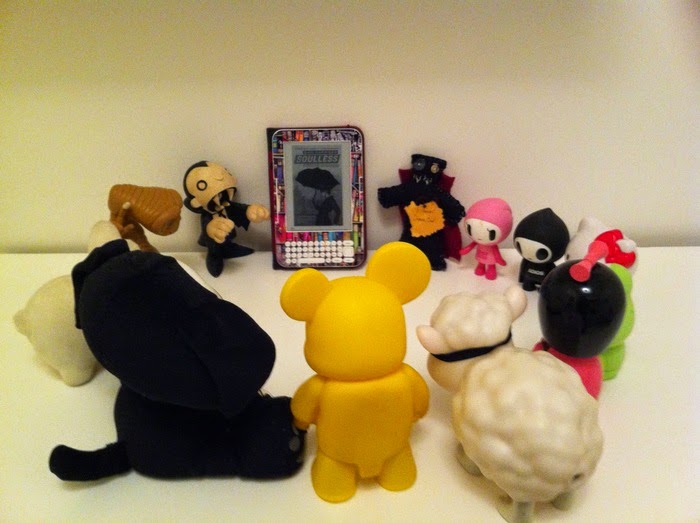One of an Occasional Series of Intellectual Salons, wherein a scientist of note hijacks this blog for the purposes of in-Gail’s-world discourse.
I received a very interesting calling card, Gentle Reader, from Dr. Kelly (she has a PhD, my readers are smart!). She graciously gave me permission to pose her question to you (slightly modified by me).
Dear Miss Carriger,
I am a new fan of your tales of Alexia Tarabotti and her feats of supernatural derring-do in Victorian London. I have read Soulless and Changeless so far, and I look forward to your further volumes.
Perhaps you speak to this question in a later story, but my professional interests urge me to make the inquiry directly to you:
Does Alexia dream?
As a scientific matter, the answer would seem to be no. Primitive peoples from the dawn of history have explained dreaming as the night journeys of the soul, temporarily liberated during sleep from the shackles of the body. (This idea was proposed by famed British anthropologist E.B. Tylor in the 1870?s, perhaps Alexia knew him?) If Alexia has no soul, then she could not dream, and sleep for her would simply be a state of quiet physical inactivity.
I find that a dissatisfying conclusion. The first piece of counter-evidence would be Alexia?s enthusiastic responsiveness to her husband?s amorous solicitations. As Dr. Freud of Vienna would begin to theorize in the 1890?s, the energies of dreaming can be intimately intertwined with the energies of erotic arousal and desire. I find it hard to imagine, as a purely professional matter of course, that a woman with so much libidinal vitality would never have dreams that express her instinctual familiarity with those deep yearnings and timeless pleasures.
A second piece of counter-evidence is Alexia?s admirable resourcefulness, which I believe should count as a species of creativity, indeed as one of the noblest forms of creativity. She may not know how to wield a brush or pluck at a harp, but she knows how to navigate through the most trying circumstances with good grace and proper decorum. That is an art form in itself, one at which Alexia is a grand master. Numerous scientific studies have suggested connections between dreaming and creative thinking, so again I have to wonder if a person with such an abundance of this type of creativity would never experience dreams reflecting the nocturnal activation of the same cerebral mechanisms that underlie creativity in the waking state.
I could adduce further evidence, but then I would have to begin using footnotes, and that would become unwieldy. Suffice it to say there are sound reasons to doubt?on purely theoretical grounds?the Tylorian hypothesis that a soulless person, a preternatural, is incapable of dreaming.
Please let me know if you possess any information that might help to cast the clear light of scientific understanding on this intriguing (to me, in any case) question.
Thank you for your consideration,
Dr. Kelly, Scientist in Good Standing
P.S. Scholarly experience has taught me that people who say they never dream often find themselves surprised when they awaken one morning and, lo and behold, a dream has rather rudely invited itself into their conscious minds and made irritatingly permanent residence there. One never knows….
Dr. Kelly adds this website for your perusal.
So, my dear, Gentle Reader, I pose this same question to you. Do preternaturals dream? For that matter, do supernaturals? How much of dreaming is a matter for the soul? How much is sourced in the the creative part of human make up?
{What is Gail’s Book Group reading for January? Kat, Incorrigible by Stephanie Burgis}
GAIL’S DAILY DOSE
Your Infusion of Cute . . .
 |
| Contest entry vampangel79_LJ |
Your Tisane of Smart . . .
Stuff You Should Know podcast talks about blimps
Your Writerly Tinctures . . .
10 things you (probably) didn’t know about the history of London
Book News:
Aurian of Boeklogboek says of Waistcoats & Weaponry,
“I love this series, and I am in awe of Gail Carrigers’ imagination. Sophronia is such a great heroine, she thinks fast on her feet, and doesn’t care about a person’s standing in society…”
Quote of the Day:
“Oil and potatoes both grow underground so french fries may have eventually produced themselves, had they not been invented.”
~ A.J. Esther
Tags: SOULLESS
I think it is unlikely that anyone who's mind is as quick moving as Alexia would not dream. I think a better question is in what manner would she dream.
Being that she is not a creative person it is unlikely that she would dream in bright, exciting or artistic ways… I would propose that alexia dreams in the inner voice you hear thoughts in but that is purely speculation.
This comment has been removed by the author.
A very interesting question, which I think one or two hints from the second and third volumes can help throw some light on.
On Alexia's creative capacities (or lack of them), we have an aside like this from 'Blameless', that preternaturals lack “the necessary imagination and soul” to become inventors, p.98. Here we see Alexia's 'resourcefulness' carefully distinguished from the kind of 'soulful' ability associated with artistic and (by implication) dreaming activity.
On Alexia's healthy and well-exercised libido, there seems to be very little of it that undergoes repression (especially when Lord Maccon is pressing his advantage), leaving nothing spare to break through to the distortions of the dreaming ego. On another note, I feel that the Freudian model would be too impractical for someone of Alexia's sensibilities, which would nip in the bud any unseemly and messy incursions of the id into her pragmatic and nicely-regulated thought processes.
Which brings me to the final point – that Alexia does not need a soul for any kind of psychic activity if we go by the passage in Changeless that states that “Lady Maccon might be soulless, but the liveliness of her mind was never in question”, p.82. Thus while she remains highly unlikely to experience the inward disturbances that characterise typical dream activity, she still retains the capacity to have dreams as part of the ordinary functions of the mind (not soul) at rest.
And now for Ms. Carriger to blow this whole argument up by having Alexia wake in her very next appearance from an unprintably exciting nighttime fantasia involving herself, Channing Channing, Madame Lefoux, and an unusally sleek and fast-moving airship… Here's hoping!
I have always thought of dreams as coming from my mind/brain rather than from the heart or soul. I imagine the soul as what is reincarnated and the mind is not which is why we cannot remember all of our lives, if that helps explain it any better.
I believe the scientific position on the soul remains "Unproven", so to say the scientific answer related to soul-less dreaming would be "no" is premature. From what we've been told, though, it seems clear that Alexia has consciousness and a mind. To the degree dreaming is the liminal mind's interpretation of bio-electric stimuli generated in the absence of gross somatic sensation I would expect her to dream. (Yes, I too have been granted authority to call myself a scientist, and am correspondingly prolix.)
What I find more interesting is the following: I understand Alexia to have become a self-made bluestocking in part to compensate for a lack of soul-sourced morality. This leads me to wonder about the nature of the dreams she has, when her conscious judgment is not in control. Are they nightmares? Would they be nightmares if somebody else experienced them? Do the sensations and interpretations she experiences, unfiltered by the inherent moral sense presumptively granted by a soul, weaken her attempts to be a moral person? Could she in some sense then be called a saint, for actively working to develop that moral sense in the face of uncontrollable opposition?
Fascinating question.
That interpretation fits Alexia's predicament nicely, especially since she herself won't have an afterlife, reincarnated or otherwise. From 'Changeless', again:
“for preternaturals like her, death was the end”, p.297.
I have to confess, I'd never thought of Alexia's bluestocking career path as a moral choice – more of a reaction against her ridiculously trivial but at the same time over-ensouled mother and sisters.
BUT it definitely creates a condition of moral hazard, if the soul is equated with the moral sense – and she is distinguished from her father in that she does not take advantage of the fact that hers is a potentially consequence-free world of action (although she is not above the occasional white lie, as she shows in 'Timeless').